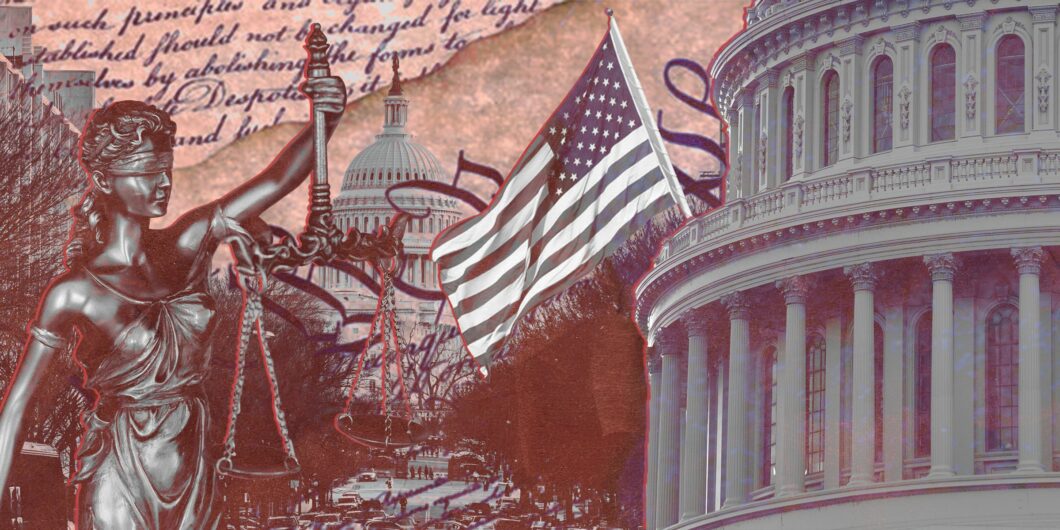Our era of radical polarization makes it more important than ever to create two kinds of reforms: electoral and size of government.
The Promise of the Bill of Rights
“As long as the reason of man continues fallible,” James Madison wrote in The Federalist Papers, “and he is at liberty to exercise it, different opinions will be formed.” The fundamental question of politics, then, is how a large number of people who will inevitably disagree with each other on many weighty matters can be made to “live together as members of the same family” and “fellow citizens of one great, respectable, and flourishing empire.”
In his lead essay, Yuval Levin gives a typically insightful and historically informed reflection on this problem. His argument, in short, is that the US Constitution equips us with the tools we need to meet the difficult challenge of wringing unity out of a “fractious people,” and that those tools are just as well-suited to the task in the twenty-first century as they were in the eighteenth. “Simply put,” he writes, “in a free and (therefore) diverse society, unity does not mean thinking alike; unity means acting together.”
Levin identifies four ways our founding charter allows us to accomplish this feat. Through federalism, it creates “space for competing approaches to governance” at the state level. With Congress, it forces various factions to come together and negotiate mutually acceptable compromises. The president’s job is to implement the law “in steady, predictable ways.” And when all else fails, the courts are there to enforce “clear boundaries on the power of majorities and public officials.”
Some 236 years on, it should be obvious that we are struggling with at least the first three of these. The federal government has metastasized, usurping all manner of responsibilities that were supposed to be reserved to the states. Razor-thin congressional majorities take it upon themselves to impose dramatic reforms, vehemently opposed by half the population, rather than working across the aisle to find common ground. And far from ensuring stability and continuity, every president now spends “half his term undoing his predecessor’s administrative actions and the other half taking actions his successor will undo.”
Each of these failures is an opportunity to return to the wisdom of the Constitution. Yet the fourth part of Levin’s equation—putting limits on what we try to do “together”—may be the most important. His essay focuses on the body of our founding charter, the part of the document that establishes and defines the various structures of the federal government. But of course, there is another component, one that exists not to enumerate governmental powers but to restrain them.
The drafters of the Constitution were initially opposed to including a declaration of rights. First of all, they thought that it was unnecessary, since the main text endowed government with only those powers they had specified. Second of all, they worried, not unreasonably, that putting some rights down on paper would lead to a belief that no other rights were protected. Nonetheless, many Americans balked. Having won their freedom from despotism abroad, people wanted a written guarantee against despotism at home. And so the Bill of Rights was born.
The genius of those ten amendments is that they take whole issues off the political table. In effect, the Bill of Rights says that there are some things the government may not do—not even if the duly elected president or a bipartisan majority in Congress thinks it would be for the best. Most regulations on speech fall into this category: Under the First Amendment, it simply doesn’t matter how many Americans think blasphemy, or flag burning, or speaking out against gay marriage should be illegal.
In a sense, the Bill of Rights attempts to remove certain questions from the political sphere. This is a beautiful instantiation of the classically liberal idea that coexistence is possible through mutual forbearance. When we agree upfront to forgo the use of state power to make others live the way we like, we can secure our own right, regardless of who may hold political office at a given moment, not to be forced to live the way they like.
People who are confident that their rights are secure from assault by competing factions will have far less of an incentive to engage in assault on competing factions.
Political expression is not the only question that the Constitution takes off the table in this way. You’re allowed to “keep and bear arms,” even if public opinion sours on guns. Your belongings can’t be searched without probable cause, and you can’t be imprisoned without due process, even if the party in power sees you as a threat. And so on.
Of course, in any polity, there are some questions where a single answer must be settled upon and enforced even against those who might dissent. Whether to drive on the right side of the road or the left is an obvious example. How children are educated may or may not be another. What classical liberalism suggests—and what the logic of the Bill of Rights should prompt us to consider—is how many questions are truly of the former type. Is it possible that the key to acting together when it really matters is to reduce the occasions on which we insist that everyone act together and expand the occasions on which we allow people to act on their own? Could there be areas not covered by the letter of the Bill of Rights where its spirit might profitably be applied?
So often today, on left and right alike, the presumption is that a good society is one in which everyone is made to live according to the correct values. We have red states threatening to terminate the parental rights of people who allow their gender dysphoric kids to “transition,” and blue states threatening to terminate the parental rights of people who refuse to allow their gender dysphoric kids to “transition.” During the pandemic, we had blue states mandating that people wear a mask anytime they left their homes (even while walking alone outdoors!) and red states prohibiting small business owners from implementing masking requirements even on their own private property.
The principle of federalism notes that such policies are better set at the state than at the federal level. But do they really need to be set by government at any level? Most American states are so large and internally diverse that the same arguments against trying to impose a one-size-fits-all national solution are arguments against trying to impose a single statewide answer as well. Much better would be to push the locus of decision-making to localities—or better still, to civil-society institutions, families, and individual people.
Our first freedom is an instructive example. It is sometimes observed that, while the Bill of Rights prohibited the national establishment of religion, states at the time of the founding could (and some did) have their own established churches. But long before the First Amendment was incorporated against the states in the twentieth century, the trend was toward disestablishment. Within fifty years of constitutional ratification, the practice of using tax dollars to fund religion had been ended in every state.
In 1785, in fact, when Virginia was considering a law to allow taxes to be collected on behalf of Christian churches, James Madison (anonymously) penned his famous “Memorial and Remonstrance Against Religious Assessments.” It is remembered as a towering defense of religious liberty and church-state separation.
“Torrents of blood have been spilt in the old world,” Madison wrote, “by vain attempts of the secular arm, to extinguish Religious discord, by proscribing all difference in Religious opinion. Time has at length revealed the true remedy. Every relaxation of narrow and rigorous policy, wherever it has been tried, has been found to assuage the disease.”
It’s something of a counterintuitive claim, but history bears it out: The key to stanching conflict among groups with antagonistic commitments is not to force them all to adopt the same set of beliefs and practices, but precisely the reverse. People who are confident that their rights are secure from assault by competing factions will have far less of an incentive to engage in assault on competing factions.
Today, unlike during the “old world” wars of religion, outright bloodshed is less of a risk (although, as affective polarization worsens, martial rhetoric does appear to be growing more common). But there are still costs to making people feel that everything rides on the outcome of the next election. If you can’t trust that whoever wins power will exercise liberal forbearance, then making sure your side wins starts to seem like the most important thing in the world. Those who think their very way of life is on the line will rationally withdraw resources and attention from all other projects and focus them on the current political battle. Thus, we have experienced the withering away of social institutions as Americans retreat into hardened partisan identity blocs.
We’re well-advised to rediscover the importance of federalism, gradualism, and compromise to good governance in a diverse society. But rediscovering that not every issue needs to be decided by government at all may be more foundational still.



